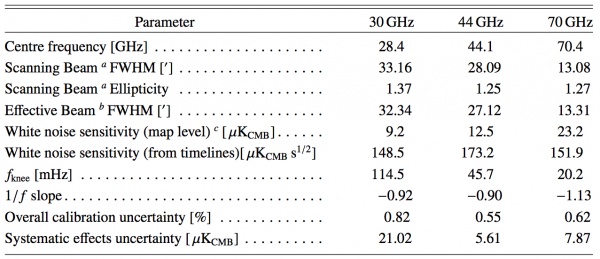Difference between revisions of "Summary LFI"
| Line 1: | Line 1: | ||
{{DISPLAYTITLE:Summary of LFI data characteristics}} | {{DISPLAYTITLE:Summary of LFI data characteristics}} | ||
| − | The LFI performance are summarized in Table 1 below. All the details can be found in the LFI data processing paper {{ | + | The LFI performance are summarized in Table 1 below. All the details can be found in the LFI data processing paper {{PlanckPapers|planck2013-p02}}. |
| Line 19: | Line 19: | ||
<math>^{ \rm b \, }</math> FWHM and ellipticity from scanning beam evaluated fitting Jupiter directly in the timelines. <math>\hspace{50mm} </math> | <math>^{ \rm b \, }</math> FWHM and ellipticity from scanning beam evaluated fitting Jupiter directly in the timelines. <math>\hspace{50mm} </math> | ||
<math>^{ \rm c \, }</math> FWHM and ellipticity from effective beam evaluated as mean from different position on the sky. <math>\hspace{42mm} </math> | <math>^{ \rm c \, }</math> FWHM and ellipticity from effective beam evaluated as mean from different position on the sky. <math>\hspace{42mm} </math> | ||
| − | <math>^{ \rm d \, }</math> FWHM from effective beam evaluated as FWHM<math>_{eff} = \sqrt{\frac{Ω}{2π}} · 2 · \sqrt{2 \log 2}</math>, where Ω is the mean beam solid angle of the effective beam. Those are the values used in the source extraction pipeline {{ | + | <math>^{ \rm d \, }</math> FWHM from effective beam evaluated as FWHM<math>_{eff} = \sqrt{\frac{Ω}{2π}} · 2 · \sqrt{2 \log 2}</math>, where Ω is the mean beam solid angle of the effective beam. Those are the values used in the source extraction pipeline {{PlanckPapers|planck2013-p05}}. |
]] | ]] | ||
</center> | </center> | ||
Revision as of 16:20, 23 July 2014
The LFI performance are summarized in Table 1 below. All the details can be found in the LFI data processing paper Planck-2013-II[1].
Table 1. Summary of the LFI performance parameters

FWHM and ellipticity from scanning beam evaluated fitting Jupiter directly in the timelines. FWHM from effective beam estimated from the main beam solid angle of the effective beam. Those are the values used in the source extraction pipeline [2]Planck-2013-XXVIII . White noise per pixel computed from half-ring difference maps. Those values are within the 1% with the white noise sensitivity computed directly on the timelines, taking in account the actual mission time minus the manoeuvres and bad-science flagged data.
References[edit]
- ↑ Planck 2013 results: The Low Frequency Instrument data processing, Planck Collaboration 2013 II, A&A, in press, (2014).
- ↑ Planck 2013 results: The Planck Catalogue of Compact Sources, Planck Collaboration XXVIII, A&A, in press, (2014).
(Planck) Low Frequency Instrument
Full-Width-at-Half-Maximum